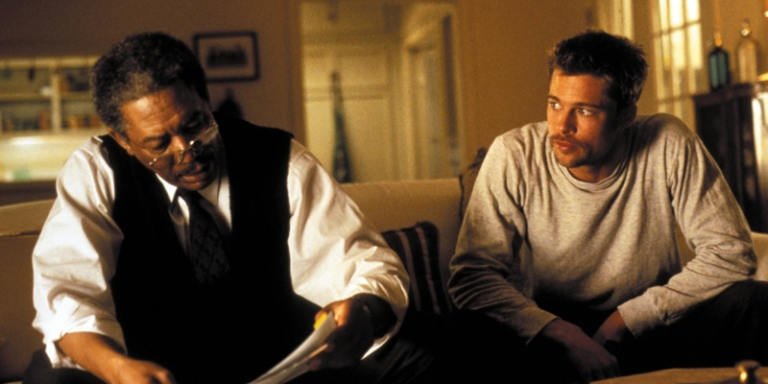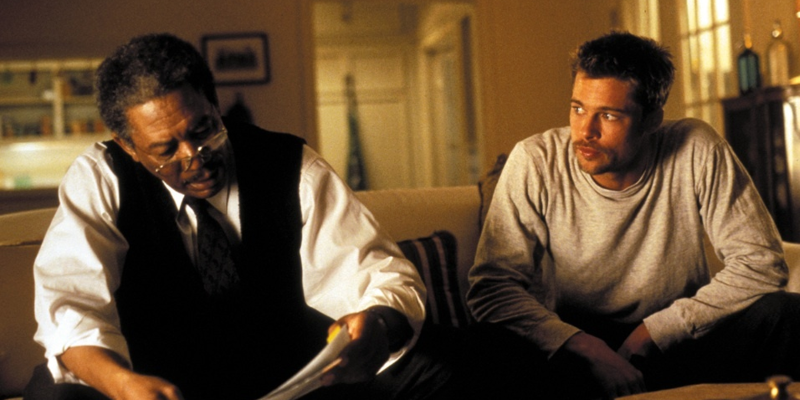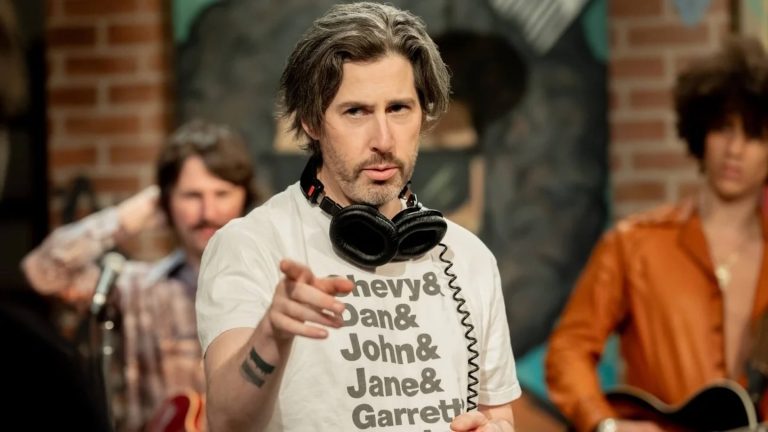"Se7en" Writer Andrew Kevin Walker's Screenwriting Wisdom on Handling Adversity

Once in a great while, a genre — which we detailed in Do You REALLY Know What Genre Your Screenplay Is? — will have a defining film that continues to resonate with the industry and the audience for decades. There are few examples that compare to the impact that Se7en continues to make.
The screenplay was written on spec — which means that it was written by the writer with the hopes that it would be purchased and produced — by Andrew Kevin Walker while he was an employee of the Times Square Tower Records in the early 90's. He took a shot in the dark and cold-called screenwriter David Koepp, who at that time was known for writing the Rob Lowe film Bad Influence. Koepp was so impressed with it that he took the script to his own agent. The agent took it out wide and the script was eventually purchased. It floated around in development hell — as most scripts do — until director David Fincher got his hands on it. The rest is cinematic history.
Walker would go on to become a well known screenwriter, although much of his work since has suffered from studio alterations. He was interviewed on Co.Create's Master Class, from which we've pulled some of the best screenwriting wisdom we've read from any Hollywood veteran screenwriter in recent years. He shared these five points of wisdom about handling adversity as a Hollywood screenwriter, which we'll elaborate on as well.
1. Be Open to Compromise, At Least in the Beginning
"It's rare that someone has a vision for a screenplay and therefore for the movie that would result from it, and seeks to fulfill that vision, and then if down the line others don’t share that vision and want to change it into some completely different thing, he’s willing to say no harm no foul, and not twist it into something that doesn’t necessarily work. The hard thing is sometimes you have to decide, 'Do I want to be the one who sticks around to rewrite this according to someone else’s vision, even if I don’t see eye to eye with that person, or do I wanna step aside and let them go fulfill it?'" Walker says.
Walker stayed through to write the many drafts that were written during that time period of development hell. He worked with a producer that wanted to turn it into something it wasn't, but because he stayed the course and stuck with the script through that harrowing process, he was still there when director David Fincher came on board. Fincher was actually given the original draft that Walker had written by mistake and when he was given an updated and rewritten version, he balked at it in favor of the original take.
The Hollywood studio system is a collaborate effort. While many may scoff at that system, it has given us many amazing films that stand the test of time. Creating such films is a lightning-in-a-bottle experience. If you the screenwriter face the adversity of the system head on and stick through the process, you may just come out of the other end with an experience like Walker's. And sometimes you won't. Such is the nature of the film and television industry.
Point being is that first and foremost, it's easy to duck and run. Showcasing adversity will allow you to learn from your mistakes — and those of others — and perhaps find yourself in a life and career changing situation. Secondly, since film is a collaborative medium, you have to learn to make compromises. Sometimes they turn out well and sometimes they don't. But it's necessary.
2. Be a Great Listener in General
"[David] Fincher has always made me part of the process," Walker says. "I think he’s a genius with story. I’ve read a scene that was written for him and not understood the core of the scene, and so I’ve said ‘Well, what’s the intention?’ and he’ll walk me through it and explain the throughline to it and I’ll ask whether that's what he told the other writer, and he’ll say yeah. It's all about listening. Fincher gives a roadmap to excellence and if you follow it, the intention lies in that scene—and if you don’t, then you’ve lost an opportunity to collaborate that’s incredibly rich. He’s very specific about what he wants, you just have to make sure you’re listening carefully."
It's natural for a screenwriter to scoff at any feedback or notes. The sad fact is that it's a necessary evil and the wise screenwriters will soon realize that all too often, many of the notes make sense, despite the fact that they may push up against the original intentions of the screenwriter.
Sure, when you get to the studio-level especially, sometimes the notes are less about the project and more about a junior executive wanting to showcase their own proof of worth for job security. Beyond that inevitable trend, screenwriters have to be good listeners because they never know when such notes and feedback are actually going to turn out to be ingenious perspectives that make the script better.
Just because the notes may take the story or characters in a different direction — slightly or grandly — doesn't mean that you'd be doing your original draft a disservice. Just because the notes may not be what you originally had in mind doesn't mean that it's the wrong direction to take. Just because the notes are sure to lead to massive rewrites and thus a massive amount of additional work doesn't mean that you should scoff.
Be a great listener. At the very least, honestly look at each and every note and explore them. You may find nothing, or you may discover the answers you may or may not have been looking for, but need. Listen.
3. If They Butcher Your Vision, Don't Watch It.
"There's a lot of stuff I don’t have credit on that has a lot of me in it, and that’s fine. There’s also a lot of stuff that I do have credit on where there’s a lot less of me in it, like even Sleepy Hollow," Walker says. "You have to have a really thick skin and be willing for a certain amount of kismet. When you’re a screenwriter, you’re sort of at the behest of your director, and you’re just hoping it’s a good marriage. The thing it comes down to whether it’s a spec script you wrote, or something you adapted, or something you’re rewriting—hopefully you poured enough of your heart and your blood and your sweat into it that it will be difficult to change things if anyone starts recreating it into an entirely different story or intent from what you set out to portray."
In the end, if you've managed to reach that level where your work is produced, you need to understand that it's the nature of the business for a project to change, as many hands fall upon it. Films only start with the screenwriter. The collaboration that it takes to make a film is widespread between studios, producers, directors, and talent. While screenwriters would love to imagine that their words would be forever unchanged, it's just not a reality unless you become an auteur or go to the literary world or stage.
In the end, you don't have to watch it. That's the easiest way to save you from the anguish.
My own miniseries Blackout suffered from some budget constraints and casting changes, which caused the production draft to be changed in favor of cutting action sequences and rewriting characters (James Brolin's character was originally written for James Earl Jones) and their storylines. While the end product is perhaps 70% of my material, the 30% that was changed or cut was drastic enough to make the miniseries feel like mine, while not really feeling like mine.
Prime example is this action sequence. While the car chase sequence plays out almost exactly as I had written, it ends suddenly when there should have been a continuing chase on foot (ala Point Break) with the climax of a quick but brutal close-quarters-combat fight sequence that leaves the hero battered, bruised, and wondering who the hell these guys are.
Why was it changed? Budget constraints. The scene doesn't have the impact that it should in the end.
The sequence below represents a pared-down version of what I had originally written and is an example of how different a scene, sequence, or story line can play out once the script has gone through a production draft, through the producer, through the director, through the talent, and especially through the editing bay. If you watch the whole miniseries, the core of what I had written is there, as is much of the dialogue and story beats. However, it doesn't pack the emotional and suspenseful impact that was originally written.
Screenwriters need to have thick skin and be ready for this because it's inevitable. When push comes to shove, don't watch it and don't read the reviews if you feel that it's gone too far past your vision that you're comfortable with. Just move onto the next project and be thankful that you were in a position that tens of thousands would love to have been in — you had your script read, you were hopefully paid for your writing, and it's been produced. There are many, many worse things in the world than that.
4. If You're Having Fun, You're Doing Something Wrong
"Personally, a lot of my writing is driven by neuroses and worry. My motto is 'Your disappointment destroys me,'" Walker says. "I’m so afraid to hand in scripts and have people go, 'God, you really fucked this up.' But if you’re a good writer, you feel like that’s what you’re doing every moment you’re sitting there writing. Another cliché that I love is, 'If you’re having fun writing, you’re doing something wrong.' Which is just to say, writing is rewriting."
This is a necessary truth that screenwriters have to understand. Writing an amazing script is hard. It should be. If it's not and you're breezing through it from beginning to end with little to no rewriting, you're doing something wrong. You should be aching over each and every scene in your script. You should be in anguish over the cuts you have to make. You should struggle and struggle to fill those plot holes and add the necessary jolt to each and every scene.
This is writing. That's what it's about. The joy comes from those moments when you find the answers that you've been struggling to find. When you solve the problem that's been holding your writing, your characters, and your stories behind. That's when it becomes fun and joyous.
If you're having fun, you're doing something wrong.
5. Adapt to Being Adaptable
"One of the biggest things I learned was to try to be careful in choosing material that wasn’t always about a serial killer so I wouldn’t just become a serial killer guy," Walker says. "I’ve written an adaptation of Somerset Maugham’s Of Human Bondage. I also did a rewrite on an Evel Kneivel project for McG that was at Universal. I wrote Silver Surfer. I wrote an original — Red, White, Black and Blue — for Paramount, which was a total '70s cop thing. I wrote a spec called Old Man Johnson that I eventually turned into a novella and put it online as a Kindle Single. To prance around from genre to genre has been incredibly valuable because it helps keep me from being The Serial Killer guy."
Being adaptable to any genre will only make your potential as a professional screenwriter greater in the eyes of representation, producers, and development executives.
Jump genres. Choose your projects wisely. The more you try means the more experience you eventually gain. Have the ability to write in both film and television platforms. Yes, you do need to exploit your strengths. You may be a great action writer. You may have an original voice for amazing dialogue. You may shine in any particular genre. But where you truly shine as a desirable screenwriter is when you can take those strengths into any genre, platform, or medium that they need you in.
Wise words from Hollywood screenwriter Andrew Kevin Walker.
Tags
Get Our Screenwriting Newsletter!
Get weekly writing inspiration delivered to your inbox - including industry news, popular articles, and more!



























